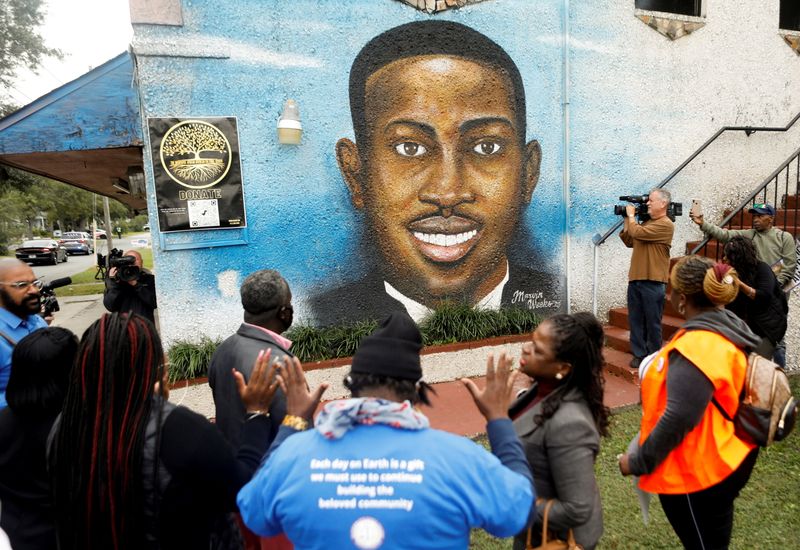By Jonathan Allen and Rich McKay
BRUNSWICK, Ga. (Reuters) -When three white men saw a Black man running through their mostly white neighborhood in southern Georgia one afternoon last year, they "assumed the worst," a prosecutor told the jury on Friday at the men's trial for the murder of Ahmaud Arbery.
When they began chasing Arbery in their pickup trucks, they did so with violent intent, according to the prosecution's opening statement: One man tried to swipe Arbery off the road with his truck, another shouted out a death threat.
Minutes later, Arbery would be shot dead by Travis McMichael, the youngest of his pursuers through the streets of Satilla Shores, a quiet, green cluster of houses outside the small coastal city of Brunswick (NYSE:BC).
Jurors looked on as a graphic video froze on a frame of Arbery's body in the street, a gaping shotgun wound in his chest, an image left onscreen as technicians tried to fix technical glitches that hindered the first day of testimony.
Gregory McMichael, 65; his son Travis McMichael, 35; and neighbor William "Roddie" Bryan, 52, have pleaded not guilty to charges of murder, aggravated assault and false imprisonment for their deadly pursuit of Arbery on Feb. 23, 2020.
Bryan's cellphone video of Travis McMichael shooting Arbery spurred outrage when it emerged more than two months after the encounter. It was seen by many as another example of a Black person falling under dangerous suspicion while engaged in some humdrum activity.
The men later said they thought Arbery might have been fleeing a crime and were trying to detain him under the state's now-repealed citizen's arrest statute in a neighborhood their lawyers say was "on edge" over reports of thefts.
"It is a citizen's job to help the police, and the law authorizes that," Robert Rubin, Travis McMichael's lawyer, said in his opening statement in the Glynn County Superior Court. "When seconds count, the police are often minutes away. The police are not going to catch this guy at the speed he's running."
Gregory McMichael was out in his driveway repairing seat cushions for his boat when Arbery ran by. He and his son grabbed a handgun and a 12-gauge shotgun and jumped in the son's pickup truck in pursuit.
The defendants' own words undermine their defense, prosecutor Linda Dunikoski said in her opening statement to the mostly white jury, which has only one Black member.
"I assumed something was up," Travis McMichael later told police when explaining why they chased Arbery, Dunikoski said.
Bryan saw the pursuit as it neared his home and jumped in his own truck. Dunikoski called the truck a "5,000-pound lethal weapon" that Bryan swerved toward Arbery four times to angle him off the road into a ditch.
"At this point in time, Mr. Arbery is under attack by all three of these men," she told the jury. Bryan got so close that they found Arbery's handprint and fibers from his white T-shirt on the truck.
"All three of these defendants did everything they did based on assumptions," Dunikoski said. "They made decisions in their driveways based on those assumptions that took a young man's life, and that is why we are here."
Dunikoski said the defendants had deadly intent, pointing to something the elder McMichael told police he shouted at Arbery: "Stop or I'll blow your fucking head off!" She said he also told police they had trapped Arbery "like a rat."
She said Arbery was simply a fitness buff and told the jury they would soon be shown his sneakers, their tread worn smooth by his avid jogging.
COVERED IN BLOOD
Rubin said in his opening statement that Travis McMichael had been frightened that Arbery might have been armed. It would turn out the jogger did not even have his cellphone on him.
McMichael opened fire in self-defense as Arbery tried to grab his shotgun, Rubin said.
In the months before the shooting, reports of several property crimes unnerved residents of Satilla Shores, Rubin said.
Arbery had been seen in security-camera video roaming around an unoccupied half-built house near the McMichaels' on several occasions in the months before shooting.
The property owner, Larry English, shared the videos with the neighbors, and Travis McMichael was among those who saw them, Rubin said.
The prosecution told the jury they would see a deposition by English, who has said nothing was taken from his property on the days Arbery was there, and that he believes Arbery was using a water source on the site to quench his thirst.

Police officer William Duggan, who was the second officer on the scene, recalled seeing Travis McMichael covered in blood and asking him if he was okay.
"It was a quick reply of basically, 'No, I'm not okay, I just effing killed somebody,'" Duggan said.